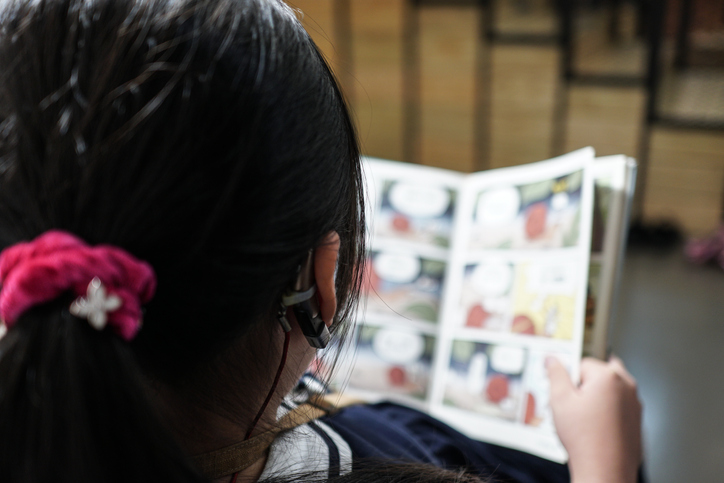

Over the past two centuries, as the world has benefited from globalization, the US has evolved as a monolingual country. I am currently in my fourteenth year of teaching French, and for me, the goal of language acquisition is to develop communicative, multilingual global citizens. But in many schools, an intensive world language curriculum isn’t available until high school. It was not until my arrival at GEMS World Academy Chicago, with a full international baccalaureate curriculum—from primary grades through high school—that I witnessed the power of world language as a core subject. Beginning language acquisition at the preschool level, maintaining it through 12th grade, and connecting it to real world topics is a brilliant way to teach our students a new language.
Why should we prioritize world language in the US education system? In 2018, almost half of young people in the US were from ethnic minority groups. Generation Z, loosely defined as those born after the year 2000, is set to be the most racially diverse generation in US history1, a figure powered by immigration and biracial relationships. And in 2011, the US Census reported that “the use of a language other than English” at home increased by 148% between 1980 and 2009. Learning world languages2 develops literacy in English, enhances problem-solving, and promotes attentional control and the ability to switch tasks. Most importantly, children are intrinsically better language learners when they’re younger, so early exposure helps them become more proficient and retain more. It can, however, be challenging to engage young learners deeply in foreign language instruction, particularly students who come from English-only households. Sometimes, we need to “trick” students into instruction, and I have found that using visual technology tools works to inspire these digital natives to venture outside their comfort zones.
Ecological Superpowers en Francais
Recently, my class had the opportunity to participate in a live Zoom interview with Celine Cousteau, granddaughter of the late Jacques Cousteau and director of Tribes on the Edge, a documentary exploring the importance of indigenous tribes to the future of the Amazon Rainforest. To engage them more deeply with the material, I asked them to use the online comic creation platform, Pixton, to create a comic strip that defined their ecological superpowers en français. They were able to choose from a variety of scenes, personalized, and imaginative character features. Narrative captioning gave students the ability to create storyboards that demonstrated their knowledge of the unit of inquiry as well as their ability to express themselves in written French.
The Literacy Superpowers of Comics
Comic books seem like an obvious choice for “pleasure reading.” Following World War II, emerging French comics like Tintin, Lucky Luck, and Asterix and Obelix were created as uplifting distractions in the aftermath of the occupation and liberation of Europe. The aim was to invite families to read together, to imagine other worlds, and to create inspiration for the future.
Comics can be much more than a happy distraction, though. Emerging research3 shows that comics and graphic novels are motivating, support struggling readers, enrich the skills of accomplished readers, and are highly effective at teaching sometimes dull or dry material. Comics can serve as a gateway to other reading and higher literacy, motivating struggling readers and enriching the skills of accomplished readers. The combination of images and the written word provide visual context clues about complex emotions and content. This strong visual aspect helps readers’ imagination anchor expressions by not only putting them in context but making the medium multimodal. Visual details aid memory formation to establish recall, which is the foundation of learning a new language. While processing text and images together leads to better recall and transfer of learning, having students create comics offers practical validation of neurological experiments showing that we process text and images in different areas of the brain, known as the Dual-Coding Theory of Cognition4. These experiments also indicate that pairing an image with text leads to increased memory retention of both. With comics, students not only learn the material faster, they learn it better.
Using Comics to Assess
Allowing students to use comics to “show what they know” also provides a useful assessment tool for educators. The work products are authentic, so the students aren’t just regurgitating knowledge, they are internalizing, processing, and remixing the information that allows the teacher to see— in a linear and visual way—whether there are gaps in their thinking or understanding in a way that they would never be able to with an essay or short-answer formative assessment. And while the ability to write well is a critical skill that I do not wish to discount, there are situations where either the ability to write well, or not, obscure whether or not students understood a particular lesson. And comics as an assessment tool go well beyond simple “checks for understanding.” Comics are a great tool for summative assessment as well, giving students the opportunity to explain their grasp of fundamental concepts and ideas, without feeling overwhelmed or hampered by the skill level of their current writing abilities. Language instruction, particularly in earlier grades, can be challenging. I have sometimes struggled to make the learning feel engaging and provide the necessary support to encourage students in their journey to fluency. By leveraging comics as an instructional tool, I have found that students are more excited to learn and that I am able to assess that learning and identify gaps in understanding with greater ease.
Links
1/ https://www.reuters.com/article/us-usa-funds-genz/as-millennials-age-more-u-s-companies-look-ahead-to-generation-z-idUSKBN1J8294
2/ https://nwcommons.nwciowa.edu/cgi/viewcontent.cgi?article=1161&context=education_masters
3/ https://www.ctd.northwestern.edu/blog/research-behind-graphic-novels-and-young-learners
4/ https://www.sciencedirect.com/topics/neuroscience/dual-coding-theory
Suzanne Giacotto ([email protected]) is a French teacher at GEMS World Academy in Chicago.







